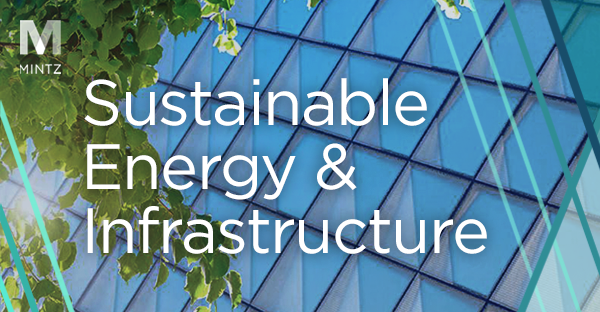Washington Energy & Sustainability Update — May 2023
House Republicans Take on Energy Policy in Debt Ceiling Legislation
As the federal government faces a potential first-ever default in June without an increase in the debt ceiling, House Republicans last month passed the Limit, Save, Grow Act of 2023 in a narrow vote of 217-215 with four Republicans voting against the measure. The bill suspends the debt limit through March 31, 2024, or until the debt increases by $1.5 trillion, whichever occurs first. The bill also includes various provisions related to energy. For example, the bill eliminated most of the energy tax incentives of the Inflation Reduction Act, requires additional federal oil and gas leasing, reduces or eliminates certain royalties and fees, and expedites the permitting process for various energy projects. The bill has no chance of passage in the Senate and the White House has issued a Statement of Administration Policy indicating that if presented with the bill the President will veto it. However, House Speaker Kevin McCarthy (R-CA) will use the bill’s passage as leverage in his negotiations with the White House on increasing the debt ceiling.
White House Hosts Major Economies Forum on Energy and Climate
Leading up to Earth Day 2023, President Biden on April 20 convened leaders of the Major Economies Forum on Energy and Climate (MEF) for the fourth time since taking office to galvanize efforts needed to tackle the climate crisis and keep a 1.5°C limit on warming within reach. Discussions focused on decarbonizing energy, ending deforestation of the Amazon and other critical forests, tackling non-CO2 climate pollutants, and advancing carbon management. As part of the day’s events, the President announced that the United States is providing $1 billion to the Green Climate Fund (GCF), bringing total U.S. contributions to the GCF to $2 billion.
EV Acceleration Challenge Announcements
On April 17, in support of President Biden’s goal of having 50 percent of all new vehicle sales be electric by 2030, the White House announced a number of public and private commitments to support the nation’s transition to electric vehicles under the EV Acceleration Challenge. Commitments were made to expand EV fleets, increase consumer education, and grow the availability of EV charging.
Executive Order Creates New White House Office of Environmental Justice
President Biden has issued a new executive order further embedding environmental justice into the work of federal agencies “to achieve real, measurable progress that communities can count on.” The new Executive Order, Revitalizing Our Nation’s Commitment to Environmental Justice for All, will deepen the Biden-Harris Administration’s whole-of-government commitment to environmental justice; better protect over-burdened communities from pollution and environmental harms; strengthen engagement with communities and mobilize federal agencies to confront existing and legacy barriers and injustices; promote the latest science, data, and research, including on cumulative impacts; expand interagency coordination and launch a new Office of Environmental Justice within the White House Council on Environmental Quality; increase accountability and transparency in federal environmental justice policy; and honor and build on the foundation of ongoing environmental justice work.
DOE Energy Savings Hub
The U.S. Department of Energy has launched a new Energy Savings Hub to provide consumers – especially homeowners, renters, and drivers – access to consumer rebates and tax credits under recently enacted energy and climate legislation. The hub also highlights a variety of low or no-cost DIY energy efficiency tips that can reduce energy usage and energy waste.
Congress Moves to End Solar Tariff Waivers
The House of Representatives on April 28 approved H.J.Res. 39, a Congressional Review Act resolution to disapprove of the Biden Administration’s two-year suspension on imposing new tariffs on solar equipment imports from Malaysia, Thailand, Cambodia, and Vietnam. The four nations are suspected of allowing companies to bypass solar tariffs by allowing Chinese products to be routed through them on their way to the U.S. The four countries account for approximately 80 percent of solar panel imports to the United States. Three Senate Democrats, including Senate Energy Committee Chairman Joe Manchin (D-WV), have indicated they will join Republicans in voting for a similar resolution when it is brought up for a vote there. However, the White House has said the President will veto the resolution, and the House vote indicates there is not support in Congress to override a veto.
House Bills Support Green Federal Buildings and Fleet
Rep. Julia Brownley (D-CA) has introduced the Green Energy for Federal Buildings Act and the Green Federal Fleet Act to direct federal resources towards renewable energy initiatives at federal facilities and on federal lands and when procuring vehicles. The Green Energy for Federal Buildings Act would require the federal government to increase the amount of renewable energy it consumes. Additionally, the Green Federal Fleet Act would require all new, non-tactical, passenger vehicles purchased or leased by the federal government to be zero-emission vehicles.
Bipartisan Infrastructure Law & Inflation Reduction Act Opportunities
ML Strategies and Mintz have launched a new Energy Funding Matrix that will serve as an aggregate resource for opportunities to leverage federal dollars in your clean and renewable energy efforts. The matrix will be updated quarterly, but you will continue to find monthly updates on BIL and IRA opportunities here in the Washington Energy & Sustainability Update.
In April, the following opportunities were announced:
- Enhanced Use of Defense Production Act for Heat Pumps (Funding Opportunity Announcement) with $250 million from the Inflation Reduction Act to ensure national security by accelerating the growth of domestic production capability of electric heat pumps to meet the anticipated increased demand for clean energy technologies as the economy transitions to net-zero emissions. There are two topic areas: 1) new or additional domestic production capability, and 2) retrofit an existing production capability. Concept papers are due May 19, 2023, and full applications are due August 1, 2023.
- IAC Program and Building Training and Assessment Program (Funding Opportunity Announcement) to establish new Industrial Assessment Centers (IACs) at community colleges, trade schools, and union training programs, as well as to create new Building Training and Assessment Centers (BTACs) at institutions of higher education, including Tribal colleges and universities. Concept papers are due May 25, 2023 and full applications July 31, 2023.
As implementation of the Bipartisan Infrastructure Law and Inflation Reduction Act continues, ML Strategies professionals, along with our colleagues at the Mintz law firm, welcome the opportunity to answer any questions about how these landmark laws may impact your business or organization.


